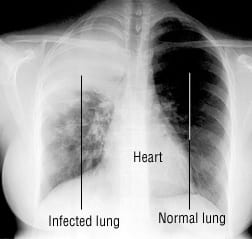Patient Basics: Pneumonia
Originally published by Harvard Health.
What Is It?
Pneumonia is an infection of the lungs. Most cases of pneumonia are caused by bacterial infections, and the most common cause in the United States is the bacteria Streptococcus pneumoniae. Other bacteria such as Mycoplasma and Legionella, as well as certain viruses, also can cause pneumonia, which is often called atypical pneumonia because these less common infections do not always cause all of the classic pneumonia symptoms. Atypical pneumonia most commonly occurs in people younger than 40.
Pneumonia that develops when someone is hospitalized for another illness tends to be more serious, because the organisms found in a hospital often become resistant to many antibiotics, and hospitalized patients weakened by other illnesses are less able to fight off the infection.
A type of pneumonia called aspiration pneumonia develops when chemical irritants and bacteria from the mouth or stomach are inhaled into the lungs. It is more common in people who have had strokes and have difficulty controlling their swallowing reflexes or people who are unconscious as a result of alcohol or other drug overdose.
Symptoms
Most types of pneumonia cause fever, cough with sputum (coughed-up mucus), shortness of breath and fatigue. In older patients, fatigue or confusion can be the only or most noticeable symptom. In atypical and viral pneumonia, a dry cough without sputum is more common.
Diagnosis
Your doctor first will ask about your symptoms. During the physical exam, your doctor will check to see if you are breathing rapidly. He or she also will look for confusion and a purplish hue in your lips, fingernails or hands because these symptoms can indicate that you have low levels of oxygen in your blood. Using a stethoscope, a health care professional can listen through your back for abnormal sounds from the lungs. The diagnosis of pneumonia most often is confirmed by a chest X-ray.
Your doctor may order blood tests to look for an elevation of infection-fighting white blood cells and to make sure your electrolytes and kidney function are normal. Samples of your sputum or blood also can be sent to a laboratory to identify the specific cause of your pneumonia. Identifying the infectious organism can help your doctor to choose the best antibiotic to treat the infection. However, even when no organism can be identified, the pneumonia still can be treated successfully with antibiotics.
Expected Duration
How long pneumonia lasts can vary from a few days to a week or longer, depending on how early you start antibiotics and what other medical problems you may have. Antibiotic treatment for pneumonia usually lasts from 5 to 14 days. Many people find that it takes a few weeks to several weeks to regain the level of energy they had before the pneumonia.
Prevention
There are two vaccines that can prevent the development of pneumonia. A vaccine against some of the common types of S. pneumoniae (pneumococcal polysaccharide vaccine, or PPSV23) is recommended for people 65 and older and for people ages 19 to 64 at higher than average risk of developing serious pneumonia. This includes people who smoke and people with:
- Lung disease including asthma
- Heart disease
- Liver disease
- Kidney disease
- A damaged spleen or no spleen
- Certain types of cancer or undergoing cancer treatment
- A weakened immune system
Another type of pneumonia vaccine (pneumococcal conjugate vaccine, or PCV13) is given to children younger than age 5. Although it is used mostly to reduce the risk of meningitis and ear infections, it also lowers the risk of pneumonia.
The influenza vaccine, which is given once a year, can prevent both flu and bacterial infections or pneumonia that can follow the flu. Anyone older than 6 months should consider getting the vaccine.
An alternative to the flu shot is the nasal influenza vaccine called FluMist. It is a live, weakened form of the virus that is inhaled and doesn’t require an injection. It is approved for use in healthy people ages 2 through 49.
Treatment
The main treatment for pneumonia is an antibiotic. A younger or healthier person can be treated safely with antibiotics at home and can feel better in a few days. Some people are at higher risk of complications and may need to be hospitalized for two days to a week. They include people who are older than 60 or have other diseases such as heart failure, active cancer, chronic kidney disease or chronic obstructive pulmonary disease (COPD).
In addition to antibiotics, other treatments for pneumonia include rest, adequate fluid, and supplemental oxygen to raise the level of oxygen in the blood.
When To Call a Professional
A simple cold or bronchitis caused by a virus can share many of the same symptoms as pneumonia. Pneumonia is possible when your cough produces sputum with a green or brown color, you are having shaking chills or you are having trouble breathing. In these cases, you should call your doctor for an urgent evaluation.
Also, if you have been diagnosed with a cold or bronchitis and symptoms are getting worse or persist after a week, you should call your doctor’s office for another evaluation.
Prognosis
Most pneumonia is treated successfully, especially if antibiotics are started early. Pneumonia can be fatal. The very old and frail, especially those with many other medical conditions, are most vulnerable.
Pneumonia usually does not cause permanent damage to the lungs. Rarely, pneumonia causes infected fluid to collect around the outside of the lung, called an empyema. The empyema may need to be drained with a special tube or surgery. With aspiration pneumonia, the affected lung may develop a lung abscess that needs many weeks of antibiotic therapy.
Additional Info
American Lung Association
61 Broadway, 6th Floor
New York, NY 10006
Toll-Free: 1-800-548-8252
http://www.lungusa.org/
National Heart, Lung, and Blood Institute (NHLBI)
P.O. Box 30105
Bethesda, MD 20824-0105
Phone: 301-592-8573
TTY: 240-629-3255
http://www.nhlbi.nih.gov/






